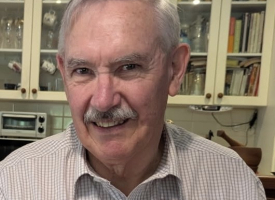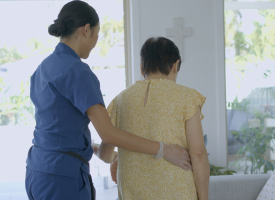AMA Vice President Dr Danielle McMullen on Medicare reform, general practice, and Grattan Institute Report
Transcript: AMA Vice President, Dr Danielle McMullen, Outlet: ABC Radio Melbourne, Mornings, Monday, 5 December 2022
Subject: Medicare reform, general practice, Grattan Institute report
Transcript: AMA Vice President, Dr Danielle McMullen, Outlet: ABC Radio Melbourne, Mornings, Monday, 5 December 2022
Subject: Medicare reform, general practice, Grattan Institute report
VIRGINIA TRIOLI: In news or analysis that probably won't surprise you, if you've been trying to get in to see a GP, if you've got a chronic illness and been thinking that the system is clunky and not actually dealing with your day-to-day situation in a realistic way, the Grattan Institute's taken a deep dive into looking at our Medicare system and has come up with the very simple conclusion that Medicare no longer works either for patients or for GPs; that other countries have reformed their general practice and their rates of avoidable hospital visits have actually reduced, but not in Australia. Here, we're spending more on hospitals while we neglect general practice. What's going on with that? I mean, has that been your experience where you're actually ending up in hospital probably for preventable issues if you just had an ongoing decent relationship with a GP? Let us know your experience. Have you even been able to get in to see a GP recently? Do you think the system needs to change? And if you've got a chronic illness, I'm sure you'd have a better insight into how that could be managed in an ongoing way rather than us leaning on a collapsing tertiary hospital system. 1300-222-774 is the number.
Danielle McMullen is Vice President of the Australian Medical Association. Danielle, good to talk to you. Good morning.
DANIELLE MCMULLEN: Good morning. Thanks for having me.
VIRGINIA TRIOLI: Does this assessment square with what the AMA thinks?
DANIELLE MCMULLEN: Yes, so what we've seen over the past few years, in fact, is that there's increasing alignment from all the GP and doctors' groups that we do need to reform Medicare. We need to make it fit-for-purpose, particularly, as you said, for people with chronic and complex illness. Now, that doesn't mean that fee-for-service is completely broken. So we do still need to support Medicare as it is, but we also need to be making those changes so that we can use the full-care team to the best of their abilities and make sure that people with chronic illness get access to world-leading, best possible general practice care.
VIRGINIA TRIOLI: Okay. Well, that's a great general and motherhood statement. I'm hoping to dig down into a much, you know, more granular level this morning. When Grattan says that the Medicare is no longer working, what exactly are we talking about? Because we have good doctors. They're well trained. We have doctors who care about what they do. We've got a system of publicly-funded health. So what exactly is not working?
DANIELLE MCMULLEN: So the main, the crux of what's challenging in general practice at the moment, is that for any funding to come into general practice, you need to have the doctor and the patient in that room together, and that means that we can't adequately fund our nurses or other allied health staff to help support that team. And so that's where we're really looking to have some of that more flexible funding so that we can either have our GPs help look after the population as a whole, and perhaps do some more remote-type monitoring of patient groups, or also using our allied health staff in that team with GP clinicians’ leadership to make sure that we can use, for example, patients with diabetes can then have ready access to a diabetes educator, a podiatrist, a dietician, others in that care team that might be able to help. At the moment, the funding really just doesn't support being able to use that team.
VIRGINIA TRIOLI: Okay. So what you're saying is that the funding is still an old-fashioned, hierarchical model, that it goes to a general practitioner and not other allied health people who could, once you've actually established someone's health circumstance, could deal with them for, say, 40 or 50, maybe even 60 per cent of their needs and their visits, rather than it being a one-on-one GP patient situation.
DANIELLE MCMULLEN: Exactly. That is part of it. And it's also things like what we call remote monitoring and the potential that actually GPs can remotely, once you know who your patient group is, be able to be involved in that care in less time but using more of those remote monitoring skills to take better care of patients along with your care team.
VIRGINIA TRIOLI: And what do you mean by remote monitoring?
DANIELLE MCMULLEN: So there are novel examples in other parts of the world and even in parts of Australia where, for example, patients at home can log certain things like their blood sugars or their blood pressures and the GP can see those from their clinic and help patients make clinical decisions or adjust medications or change their therapy or book them in if they need to be seen with a bit of remote oversight of what's happening with health and work together in partnership, particularly for people with chronic disease.
VIRGINIA TRIOLI: Is it simply a matter of a lack of money? I mean, GPs have been talking for some time about their own Medicare rebate not keeping track with the cost of living and actually making it unsustainable for them to stay in general practice. Is that a big part of it?
DANIELLE MCMULLEN: It is. It's certainly a huge part of it. So we know that this year the Medicare rebate back to patients for a standard consultation is less than half the cost of actually providing that care. So for doctors trying to look after their most vulnerable patients, they're taking more than a 50 per cent discount on those services if they're choosing to bulk bill. So we do need to bolster the Medicare rebate for consultations and make sure that we can keep our doors open. And then we, in addition to that, need to have these more flexible funding pools to make sure that we can use the team and work together, particularly for chronic disease management.
VIRGINIA TRIOLI: Are GPs up for that, though, Danielle McMullen? Do GPs, or some GPs like the idea of relinquishing that kind of direct care to another team, to Allied health, to other people?
DANIELLE MCMULLEN: Look, I think we shouldn't underestimate, any reform in a system comes with challenges, but we do know that GPs and doctors in general are actually really well trained in team-based care. And our current model of general practice in Australia doesn't easily support that. So we do have a bunch of doctors out there with the skills and ready to use them. Like anything, there'll be some push back in other directions, but we're quite keen to see a flexible option that takes forward people who are ready to practise a bit differently. And also, as I said, still supporting usual care to make sure that people operating under the current system still have enough funding to keep their doors open and patients have access to proper Medicare rebates.
VIRGINIA TRIOLI: Danielle McMullen is with you, Vice President of the AMA. I'm taking your calls and Mo, Matt and Martina, I can see you there and I'll come to you in just a moment. But what about the reform that's been done in other countries? I've got a comment here: Why on earth are you comparing with overseas medical systems? We have one of the most successful systems in the world, ranked only behind some of the Scandinavian countries, writes Marie. Well, Marie, that's a comparison or a comment that's been made by the Grattan Institute, not me, that other countries have reformed general practice. And their rates, they say, of avoidable hospital visits for chronic disease are falling but ours are not. Do you agree with the Grattan's assessment there, Danielle? And can you tell us a little bit about the comparative systems overseas where they do it better?
DANIELLE MCMULLEN: So we do have an excellent healthcare system here and no one's denying that, but that shouldn't take the pressure off for us to look for ways to improve. And in particular, what we're seeing slip in Australia is access to care. And we know that people are struggling to get in with GPs, not just for a sore toe or a sore tummy today, but for their chronic disease management, and then are winding up in hospitals when their disease is less well controlled. So we do need better access to general practice care and that better access to team-based care. And that's why we look to countries like some of those in the Scandinavian nations in particular, to see what lessons we can learn and how we can adjust our systems of care to improve on what's already an excellent system.
VIRGINIA TRIOLI: Except there's a fundamental problem at the heart of the system and the Grattan acknowledges this, which is that we've got a system at the moment, the current method, and you were indicating this, it rewards GPs who see lots of patients in quick succession - and our appointment times are still in 15 minute blocks - rather than spending more time with patients who need more care. So do you feel like there's going to be federal appetite to dismantle that system?
DANIELLE MCMULLEN: The Health Minister, I think, really does get it. He's dedicated a whole lot of time through the Strengthening Medicare Taskforce and in other forums to really understand the issues facing general practice and facing healthcare, and work on solutions together with the profession and with patients to make sure that we come up with a system that works. So I do think that there is an appetite from government to do things better. And as you said, and the AMA has also been pushing, as you mentioned, for longer, better reward of longer consultations for patients who need it, and also making sure that we support the current models of care to make sure the patients are getting access to care, but also open up those flexible options in future to do things differently and use our general practice team to the best of their abilities, make sure we're really wrapping around patients and giving that holistic care.
VIRGINIA TRIOLI: Good to talk to you, Danielle. Thanks so much.
DANIELLE MCMULLEN: Thanks very much.
VIRGINIA TRIOLI: Danielle McMullen, Vice President of the Australian Medical Association.



